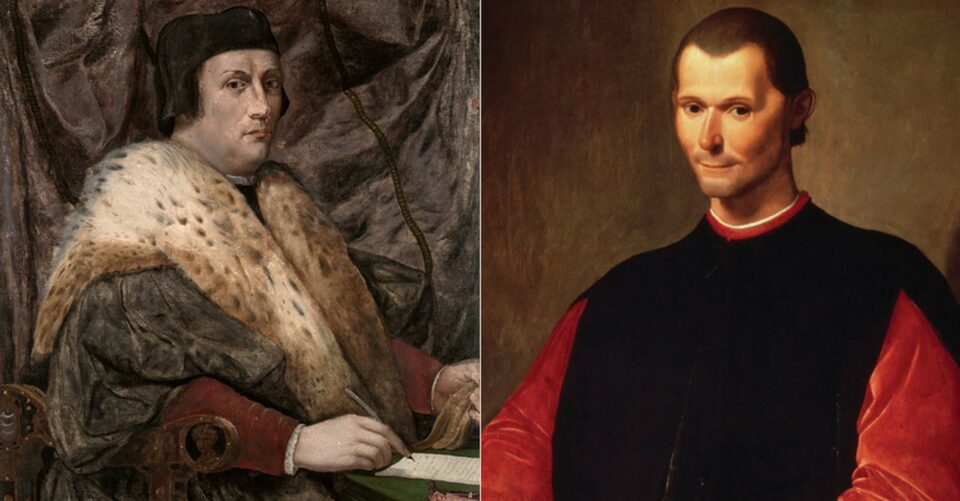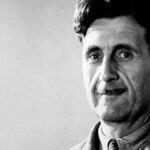
“The world is in flux. November’s elections in the United States will speed up the pace of change. There is a danger that politicians across the West are positioning themselves to govern a world that will no longer exist by the time they come to power.”
Five hundred years ago, two friends were living through a time of crisis and disillusionment, when old traditions and institutions were being uprooted, and smaller states were falling victim to the ambition of superpowers. One friend came to be much better known than the other: Niccolo Machiavelli, often referred to as the father of modern political philosophy. His lesser-known friend was Francesco Guicciardini. Contained in the writings of both, and the correspondence between them, are lessons for political leaders in our own tumultuous times.
Both were born in Florence, Machiavelli in 1469 and Guicciardini in 1483. Both served the Florentine state and wrote based on their firsthand experience of public service and diplomacy. Machiavelli worked as secretary to the second chancery of the Republic of Florence, after the Medici family who had ruled Florence since 1434 had been disposed and exiled in 1494, when French troops invaded Italy (an event Guicciardini would later see as the turning point of his age). During this time, he served as ambassador to Duke Cesare Borgia, Rome, and France and established a Florentine militia. He distrusted mercenaries, believing them to be unpatriotic and often unreliable when most needed. His militia of soldier-citizens conquered Pisa in 1509.
Guicciardini was ambassador to King Ferdinand of Aragon. He was at the Spanish court when in 1512 the Florentines, under pressure from Charles V, Holy Roman Emperor, restored Medici rule after Charles’ Hapsburg troops besieged the city. After the return of the Medici, Machiavelli was accused of conspiracy and was imprisoned and tortured. He denied involvement and was released after three weeks. He retired to exile at his farm estate, never to return to the heart of the government of the city-state again.
Upon Guicciardini’s return to Florence, he worked in internal security, before Pope Leo X appointed him governor of Modena and then Reggio. He would serve the papacy almost continuously until 1534, including as the commissioner general of the papal army. In 1521, the same year that Guicciardini first met Machiavelli and their correspondence began, he prevented Parma from falling to the French. In 1523, he had to defend Modena and Reggio, holding the former against much superior forces but losing the latter. In 1526, he was called to Rome, where he advocated an alliance with the French against Charles V. However, Charles’ armies rampaged through Italy, and Hapsburg troops sacked Rome in 1527. In 1530, the Florentine Republic ended after defeat in the Battle of Gavinana. The Medici were restored this time as hereditary dukes.
While Guicciardini was still involved in the tumultuous politics of the time, Machiavelli became popular for writing plays, rather than the political writings which were his real passion. His best-known work today, The Prince, attempts to guide rulers living in chaotic times. In it, he adopts a consequentialist morality, arguing that the virtues that make a good man (in Christian terms) are not identical to those that make a good ruler. Both writers, who had firsthand experience of conflict, saw violence as integral to politics. Guicciardini, in his collection of maxims Ricordi politici e civili, claimed, “all states will be found to have had their origin in violence.”
At the time, political theory was dominated by the idea that a ruler should act according to the virtues. If they did so, success would follow. These virtues were largely defined by two Roman statesmen: Seneca and Cicero. Mirror books for princes, popular books that would describe the ideal attributes for rulers to mirror, described a ruler who was just, generous, and clement. They would never act by sheer force, or by fraud. Machiavelli satirizes this ideal.
Machiavelli wants to “to go to the real truth of the matter, not to repeat other people’s fantasies.” Human nature is beastly, fickle, and brutal. To survive, a ruler must know how to imitate both the lion and the fox. The lion cannot defend itself against snares, and the fox cannot defend itself from wolves. A ruler must play the fox to see the snares and the lion to scare off the wolves.
The virtues are the qualities through which a ruler achieves his goals, the first of which should be to stay in power. A ruler should be prepared to do whatever is necessary to do this. Machiavelli approves of means many people (in Machiavelli’s time and today) would consider unethical to secure political ends. He claims, “it must be understood that a prince, and especially a new prince, cannot observe all those things which are considered good in men, being often obliged, in order to maintain the state, to act against faith, against charity, against humanity, and against religion.” This was controversial advice in the sixteenth century.
Machiavelli uses Borgia as an example of a strong leader. He discusses how Borgia disguised his intentions, weakened his opposition, broke old loyalties, enriched allies, and eliminated rivals. Machiavelli believed it was better for rulers to be feared than loved, but ideally a leader would be both. Borgia could be brutal, but only when it was absolutely necessary. While it is good to be feared, being hated is to be avoided at all costs.
Machiavelli also looked to ancient Rome. His other major political work was The Discourses on the First Ten Books of Titus Livius, or the Discourses. Machiavelli discusses a series of lessons from Rome to demonstrate how a republic should be started and structured. Guicciardini, however, criticizes Machiavelli for his tendency to draw sweeping conclusions from inadequate evidence, and for his obsession with Rome.
Guicciardini noted that the ancient times of the Romans and Greeks were no longer. There was no one political order which fitted every society throughout the ages. Guicciardini believed every time had its own unique circumstances, although this did not stop him from drawing lessons from the past. His masterpiece, the History of Italy, was unique in its focus on investigation and realistic analysis of the causes of historical change, and why people, especially leaders, behave as they do.
While Machiavelli promoted virtue in the ideal leader, Guicciardini prioritized prudence. He believed the ideal leader should be guided by reason, though history shows this is rare: “…I have often found men judge wrongly from looking to what this or the other prince ought in reason to do, and not to what his temper and character will prompt him to do.” People are primarily motivated by self-interest, but do not always use reason to achieve their ends.
Both Machiavelli and Guicciardini’s insights on human nature are useful to understanding today’s increasing number of dictators and oligarchs driving chaos through the geopolitical system. Journalist David Ignatius notes that we live in a world in which “Machiavellian personalities — ruthless leaders with a cynical view of human nature — seem increasingly dominant.” He gives Russian President Vladimir Putin, Chinese President Xi Jinping and Turkish President Recep Tayyip Erdogan as examples.
Machiavelli and Guicciardini had more in common than they did apart. Their letters were full of praise for each other and requests for counsel. They were both patriots who believed in a united Italy. They agreed on one of the key debates of the day: whether events were determined by human action or by luck.
Machiavelli believed however a person acted, virtuously or not, was only half of the story. Fortuna (luck) also played a major role. Guicciardini agreed:
“When I consider to what risks and perils of sickness, accident, violence, and numberless other ills, the life of man is open, and call to mind how many circumstances must combine to throughout the year to ensure a good harvest, nothing fills me with more wonder than that any man should live to be old, or any year be fruitful.”
Early in his career, Guicciardini believed that by using reason a ruler could strongly influence the fate of his people. However, as he spent his later years in exile, having witnessed the chaos that resulted from the Italian peninsula becoming a theater of the struggle for European hegemony, he came to believe fortuna, the embodiment of the uncontrollable forces, had the much greater influence. Writing his History, he concluded that no single event had a clear beginning, and the investigation of causal connections only exposed the vista of an infinite number of further relationships and interdependencies.
Machiavelli, while recognizing the role of luck, believed rulers had more agency. A strong leader could survive the vicissitudes of fortuna that brought war, famine, disease, and political chaos, and could protect the state and its citizens. He used the metaphor of a destructive, wild river that overflows in the winter months, when there is little one can do to alter its path. However, by building dykes and dams in the summer months, one can minimize its impact on settlements in its path. This long-term thinking is the mark of a good ruler.
Guicciardini, no doubt influenced by his experiences, thought this was ultimately a doomed task:
“All cities, states, and governments are mortal, since either by nature or accident, everything in this world must some time have an end. Accordingly, the citizen who happens to be living when his country is in its decline should not so much lament over its unhappy fortunes as over his own. For his country only suffers what it was fated to suffer. His is the infelicity of being born at the moment when his country has to fulfill its doom.”
Today, we see the mortality of the global political and economic system that has been in place since 1945. The global market regime in place since the end of the Cold War characterized by rapid globalization is breaking down, and we are left with the unequal growth that globalization and the subservience of national interests to markets has created. At the same time, Russia’s invasion of Ukraine—which may be an historical turning point comparable to the 1494 French invasion of Italy that heralded the political instability within their era—has accelerated the reawakening of great power rivalries, exposing the violent roots of our geopolitical system. In our interconnected and interdependent world, national-level challenges are mostly caused by (and will be exacerbated by) the turbulent geopolitics outside the control of whoever will win this year’s series of elections across the West, including in the United States and the United Kingdom. However, there are still steps the winners can take to protect us from the worst impacts of further instability.
Nostalgia has been driving a strand of Western politics in the last decade. The future looks uncertain, so politicians have promised to take us back to a more certain past. However, as Guicciardini pointed out in his criticism of Machiavelli, solutions need to consider the world we are now in—not one that is long gone.
Leaders in both the United States and the United Kingdom are discovering old solutions no longer work, and the hypocrisy of Western foreign policy will no longer be tolerated by the Global South or large chunks of their own electorate. The war in Gaza has undermined the positions of both the Democratic Party in the United States and the Labour Party in the United Kingdom, highlighting a lack of consistent principles in both. Both parties need to remind us of what they stand for, or the perception of unprincipled technocrats with no ambition beyond administering the prevailing regime more competently will spread. Machiavelli tells us leaders should be ruthlessly pragmatic but should seem virtuous, even if they are not. Neither President Joe Biden nor Labour leader Keir Starmer are meeting his standard. Both would do well to take Guicciardini’s advice: “Think less of gaining good-will than of maintaining a good reputation. For losing reputation, you lose good-will, in room whereof comes contempt.”
The world is in flux. November’s elections in the United States will speed up the pace of change. There is a danger that politicians across the West are positioning themselves to govern a world that will no longer exist by the time they come to power. In the United Kingdom, Starmer has noted that the next government will face challenges equal to those of 1945, 1964, and 1997 combined. A bold vision is needed to manage the challenges of the next decade.
Borgia acted in the correct manner but was still undone by bad luck, falling ill just as his enemies attacked. Today’s politicians may be undone by geopolitics and economics outside of their control, regardless of their domestic policies. They must focus equally on foreign policy and follow the advice of Machiavelli and Guicciardini, who understood that due to the interactions of powers outside of their own borders, leaders had to prioritize—first and foremost—providing security for their people.
We may be entering a time of great power rivals similar to sixteenth century Italy, but dykes and dams can still be built in the form of political and military alliances. The patchwork of Italian states was vulnerable to invading foreign powers. Both Machiavelli and Guicciardini recognized the importance of allies. Building new alliances and upholding existing multilateral treaty organizations is as important as ever. A network of smaller, more focused alliances could present the most effective way to navigate the multi-matrixed world we find ourselves in. The 2021 trilateral pact between Australia, the United Kingdom, and the United States in the Indo-Pacific known as AUKUS is one example. Military and political ties between European powers are more important than they have been since 1945. Security agreements between the United Kingdom, Finland and Sweden countering the Russian threat should be further built upon. The leader of French President Emmanuel Macron’s political group in Brussels has called to revive former British Prime Minister Theresa May’s proposal for an European Union-wide defense treaty.
We need to build dams and dykes that do not rely solely on existing treaties to protect against further Russian aggression and increasing escalations between the United States and China as Xi moves towards securing his legacy of reuniting Taiwan. A second Donald Trump presidency could well see a reduction of American support to Ukraine and an escalation of trade tensions with China. Machiavelli would likely admire President Trump’s dismissive attitude to those who promote the ideal attributes of a leader in today’s mirror books but would caution him to have a more nuanced understanding of the complexity of geopolitics. Not every relationship is a zero-sum game, and, if President Trump wins, he will have to promote at least a semblance of ideological commonality with America’s allies. European leaders, meanwhile, will need to show more pragmatism toward President Trump if he returns to power.
Despite his acceptance of the role of fortuna and his later belief in the impotence of leaders to influence external events, Guicciardini believed leaders could and should still follow reason and live virtuously. By doing so, they would come to appreciate the true value of humankind. This value, when clearly articulated, can bind us together, and it includes our need not just for competent management but, also, for meaning and belonging. Both Guicciardini and Machiavelli would likely encourage today’s leaders to adopt a pragmatic approach toward gaining and maintaining power, while also emphasizing the need to decide which virtues their leadership will epitomize, as well as to stand by these regardless of the challenges fortuna throws their way.
Andy Owen is a former soldier who writes about the philosophy and ethics of war and geopolitics. He has been published in TIME, Aeon, The Spectator, The New European, and The Critic. His fictionalized memoir, Land of the Blind, which tells the story of the intelligence war in Afghanistan, was released this month.











